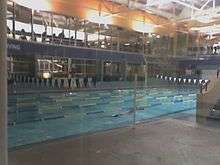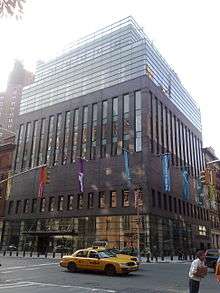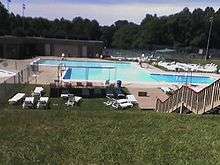Jewish Community Center
A Jewish Community Center or Jewish Community Centre (JCC) is a general recreational, social, and fraternal organization serving the Jewish community in a number of cities. JCCs promote Jewish culture and heritage through holiday celebrations, Israel-related programming, and Jewish education. However, they are open to everyone in the community.
| Predecessor | Hebrew Young Men's Literary Association, Young Men's Hebrew Association (YMHA), Jewish Welfare Board |
|---|---|
| Founded | 1854[1] |
| Founder | Dr. Aaron Friedenwald[1] |
| Founded at | Baltimore, Maryland, U.S.[1] |
| 13-5599486[2] | |
| Legal status | 501(c)(3) nonprofit organization[2] |
| Purpose | To strengthen Jewish life in North America through direct service to affiliate Jewish community centers, Young Men's/Women's Hebrew Associations, and camps by providing leadership and guidance to the Jewish Community Center movement; and to serve Jewish personnel in the armed forces through the Jewish welfare board.[3] |
| Headquarters | 520 Eighth Avenue, New York, NY 10018 U.S. |
| Coordinates | 40.753591°N 73.991950°W |
Region | North America |
President, Chief Executive Officer | Doron Krakow[4] |
| Subsidiaries | The Florence G Heller JCC Association Research Center Inc 501(c)(3)[3] |
Revenue (2016) | $12,717,523[3] |
| Expenses (2016) | $13,474,227[3] |
| Endowment | $17,832,339 (2016)[3] |
Employees (2016) | 59[3] |
Volunteers (2016) | 93[3] |
| Website | www |
The JCC Association is the continental umbrella organization for the Jewish Community Center movement, which includes more than 350 JCCs, YM–YWHAs, and camp sites in the U.S. and Canada, in addition to 180 local JCCs in the former Soviet Union, 70 in Latin America, 50 in Europe, and close to 500 smaller centres in Israel.
History
The Hebrew Young Men's Literary Association was first set up in 1854 in a building at the corner of Fayette and Gay streets in Baltimore, Maryland[5] to provide support for Jewish immigrants.[1][6] Dr. Aaron Friedenwald was the group's founder and first president.[1]
The first Young Men's Hebrew Association (YMHA) was founded in New York City on October 10, 1874, with Lewis May as its first president.[7] The first official headquarters were at 112 West 21st Street in Manhattan.[7] Young Women's Hebrew Association (YWHA) was first established as an annex to the YMHA in 1888.[8] YWHA was founded to provide spiritual and material support for the young Jewish women who were moving to cities at the time.[9] YMHA helped young Jewish women find housing and employment.[9] Fannie Liebovitz was one of the founders.[10] The first independent YWHA was established in 1902.[8] The New York YMHA and YWHA now operate together as the 92nd Street Y. (There are two other YM–YWHA organizations in Manhattan, which are not affiliated with the 92nd Street Y. They are the 14th Street Y, and the YM & YWHA of Washington Heights and Inwood. The 14th Street Y, in the Gramercy/East Village neighborhood, is a branch of the Educational Alliance. The Washington Heights organization serves a diverse community uptown.) In 1917, these organizations were combined into a Jewish Welfare Board.
Following a merger of the Young Men's Hebrew Association, Young Women's Hebrew Association, and the Jewish Education Alliance, the organization was renamed Jewish Community Center (JCC) in 1951.[1] Many member organizations adopted the new name, but some other member organizations did not do so, particularly in the New York metropolitan area, such as:
- In Manhattan, New York City, New York
- YM & YWHA of Washington Heights & Inwood
- 92nd Street Y, (formally, The Young Men's and Young Women's Hebrew Association, New York, New York)[11]
- 14th Street Y
- In Brooklyn, New York
- Boro Park Y in Borough Park, (founded as YMHA)[12]
- Jewish Community House, or JCH, in Bensonhurst, Brooklyn
- Kings Bay Y in Sheepshead Bay, with branches in northern Brooklyn
- Shorefront Y
- Riverdale YM-YWHA in The Bronx, New York City, New York
- Samuel Field Y and Central Queens Y in Queens, New York (two agencies merging as of 2018)
- In New Jersey
- Center for Jewish Life (CJL) in East Brunswick, successor to YM-YWHA of Raritan Valley in Highland Park (closed 2006)[13][14]
- YM-YWHA of Clifton/Passaic (name retained until its closing in 2011)[15]
- YM-YWHA of North Jersey in Wayne (name retained until sale to Metro YMCA in 2011)[16]
- Jewish Community Alliance of Jacksonville, Florida
An example of the objectives of Jewish Community Centers can be seen within the New Bedford, Massachusetts branch's Constitution. In January 1947, the Jewish Community Center of New Bedford listed the following objectives:
- To foster and develop the highest values of Jewish spiritual and cultural life.
- To provide social, educational, literary, benevolent, recreational and athletic activities for the benefit of Jewish men, women, and children of New Bedford.
- To serve the spiritual, intellectual, social, and physical welfare of its members.
- To fulfill the great ideals of American citizenship.[17]
Services

JCC Association offers a wide range of services and resources to help its affiliates to provide educational, cultural, social, Jewish identity-building, and recreational programs for people of all ages and backgrounds. JCC Association[18] supports the largest network of Jewish early childhood centers and Jewish summer camps in North America, and is also a U.S. government accredited agency for serving the religious and social needs of Jewish military personnel through JWB Jewish Chaplains Council.[19]
Some JCCs provide services for people with special needs, such as autism spectrum disorders and learning disabilities. In 2008, The Mandel JCC of Cleveland[20] was awarded $652,500 in grant funding to be used for individuals with disabilities. Cleveland-area children and adults with emotional, physical and developmental disabilities now have many opportunities to get involved in fitness, wellness and recreational activities. Whenever possible, activities are inclusive and children are able to fully participate, usually with the assistance of an aide.
As a rule, today JCCs are open to other ethnic groups as well, with a possible exception of strictly traditional Jewish activities. In fact, many JCCs sponsor local events. There are, however, many other activities that anyone can host at the JCC.
Locations
There are almost two dozen Jewish community centers in the New York metro area, providing a wide range of social, cultural, and educational services, ranging from lectures, concerts, theater performances, and dance recitals to health and fitness classes, job training workshops, and citizenship classes. Although the majority of JCCs are found on the East Coast, with 17 sites in Florida, JCCs operate in many other communities. For example, California has 17 locations—eight in the San Francisco Bay Area and nine scattered through Southern California—and the Chicago metropolitan area has 10. Almost all of the largest metropolitan areas in the U.S. now have at least one JCC, and a handful of smaller communities also have locations. JCCs all over the country sponsor film festivals and book fairs, bringing world-renowned writers and directors to smaller communities.

.jpg)
Their programs and activities vary by location. Particularly noteworthy is the JCC in West Bloomfield, Michigan,[21] which is the largest JCC in North America, and possibly the world. The Holocaust Memorial Center, which attracts many visitors to its programs and exhibits, used to be a part of the JCC of West Bloomfield, but recently opened a building of its own. The West Bloomfield JCC houses two gymnasiums which can be made into three gyms using a movable wall, a workout area, an indoor full size and kiddie pool, an outdoor full size pool, a kosher restaurant, a Michigan Jewish war veterans museum, an in line hockey center, a library, ceramics/art rooms, a large multi-purpose room (Handleman Hall), an art museum, an area dedicated to teaching and learning about tzedakah (charity) called Shalom Street, a performing arts theater in the basement, a preschool, offices for summer camps, the previously mentioned preschool, and other administrative offices and organizations. The top floor is completely dedicated to The Jean and Samuel Frankel Jewish Academy of Metropolitan Detroit,[22] a Jewish High School which opened in 2000. The JCC building is on the Eugene and Marcia Applebaum Jewish Community Campus along with multiple living quarters for the elderly and mentally disabled and an Alzheimer's treatment building.

One recent addition to the family of JCC's in North America is The JCC in Manhattan.[23] This eleven story building situated in Manhattan's Upper West Side neighborhood opened its doors in the winter of 2002. The JCC offers a diversity of programs, from parenting to fitness, and each year the organization produces Israel NonStop, a week-long festival presenting the most interesting and innovative Israeli musicians, authors, theatrical groups and films.
In 2011, the Joan and Alan Bernikow JCC of Staten Island installed solar panels as part of a solar thermal system.[24] The solar panels are expected to reduce 27,500 pounds of carbon dioxide emissions, the equivalent of planting two acres of Douglas fir trees every year. Its two dozen 10-foot solar panels will keep the building's hot water at a constant temperature of 180 degrees. Up next is the installation of a photo voltaic system, which will use solar panels to convert sunlight into electricity. This is part of JCC's vision of environmental sustainability, which benefits the community both ethically and economically.
The Robert & Dorothy Ludwig Schenectady JCC became well known for their "million likes" photo that went viral in less than 48 hours. The photo showed three of its camp staff holding a sign that said "Our boss said that if this picture gets 1,000,000 likes that our summer camp can get an outdoor movie screen." In less than a week the picture received over 300,000 likes and it was one of the most successful uses of social media ever by a JCC.
Incidents and security
In recent decades, several incidents that have taken place at JCCs and other Jewish-related locations across the United States and Canada, as well as the September 11 attacks, have prompted JCCs in all areas to increase security at their facilities. Some of these events have included:
- The 1994 AMIA bombing in Buenos Aires resulted in 85 deaths and over 300 injured persons.
- In 1997, a woman in Toronto was charged with kidnapping and other crimes in the unauthorized removal of her 5-year-old daughter from a JCC childcare center. The woman, a registered nurse who had previously lost custody of her child following a divorce, led police on a high-speed chase and crashed, causing minor injuries to both.
- In the Los Angeles Jewish Community Center shooting on August 10, 1999, a white supremacist opened fire and wounded four children and one adult.[25] All survived, but the shooter was later convicted of homicide in a separate incident.
- In the Seattle Jewish Federation shooting on July 29, 2006, one person was killed when a Muslim man named Naveed Afzal Haq opened fire.[26] This shooting was in response to the offender's anger at the United States for the Iraq War and its support for Israel.
- In the Overland Park Jewish Community Center shooting on April 13, 2014, a white supremacist opened fire in the parking lot of the JCC of Greater Kansas City in Overland Park, Kansas and at a nearby Jewish retirement home. Three were killed in the incident and two others were shot at but were unharmed.
- Starting in 2017, over 100 JCCs received bomb threats. By March, two suspects were arrested: Juan M. Thompson, a former journalist who was attempting to frame his ex-girlfriend for making antisemitic threats; and an unidentified, mentally ill 18-year-old Israeli-American man.[27][28] who in April 2017 was charged in an Israeli court with several crimes including an attempt to extort a United States senator, "publishing false reports causing public panic, conspiring to commit a crime, hacking computers to commit a crime, and violations of money-laundering laws". The indictment alleges that he threatened "2,000 different institutions around the world, including the Israeli embassy in Washington, the Israeli consulate in Miami, schools, malls, police stations, hospitals and airlines." In the same month he faced a similar indictment in a Florida court which included 28 crimes.[29]
New security measures now being implemented include the mandatory display of photo ID (for non-members) upon entry to the building, background checks of prospective employees and members, and police officers or security guards being stationed on premises. Childcare areas now have their access restricted to those who have legitimate reason to enter, and removal of a child, which is tightly monitored, is permitted only by custodial parents and guardians and other authorized adults. In addition, many other new security features now reduce the likelihood of non-members gaining access to member-restricted areas.
Notable members
- Tal Brody, who was drafted #12 in the NBA draft but opted to play for Israel, began playing basketball at the Trenton JCC.[30][31]
- Jake Cohen, who plays basketball for Maccabi Tel Aviv, played for the Philadelphia JCC team which won a gold medal at the 2007 JCC Maccabi Games. He scored 33 points in the finals.[32]
- Ross Friedman, Major League Soccer player
- Bruno Sammartino, former two-time WWF (now WWE) champion. It was at a YMHA in Pittsburgh that he discovered weight lifting.
- Ingrid Michaelson, indie-pop singer-songwriter. Student of the JCC of Staten Island's Dorothy Delson Kuhn Music Institute. While there she met vocal coach Elizabeth McCullough, who worked with her through high school.
- Cullen Jones, Olympic gold medalist for swimming, was a childhood member of Metro Express, a swim team at the JCC MetroWest in West Orange, NJ.[33]
- Sandy Koufax, Baseball Hall of Fame pitcher, played basketball at the Edith and Carl Marks Jewish Community House of Bensonhurst as a teenager.[34]
- Daniel Steres (born 1990), professional soccer player with the LA Galaxy, was a three-time JCC Maccabi Championship Team member.[35]
See also
- Jewish Center (disambiguation)
References
- "Young Men's Hebrew Group 100 Years Old This Week". The Baltimore Sun. January 8, 1954.
- "Jewish Community Centers Assoc Of North America. Tax Exempt Organization Search. Internal Revenue Service. Retrieved June 16, 2018.
- "Return of Organization Exempt from Income Tax". Jewish Community Centers Association of North America. Guidestar. December 31, 2016.
- "Meet Us". JCC Association of North America. Retrieved June 16, 2018.
- "History of the Greater Baltimore JCC," Archived 2015-06-14 at the Wayback Machine Jewish Community Center of Greater Baltimore website. Accessed June 12, 2015,
- Shapiro, Marc; Katz, Justin (May 20, 2016). "Envisioning the Future". Baltimore Jewish Times. Vol. 350. Issue 3. p. 54-59.
- "The Young Men's Hebew Association: Formal Opening of the New Building of the Society—Addresses by Mr. Lewis May, Mr. De Cordova, and Others". The New York Times. October 11, 1874. p. 7.
- Jaffe, Maayan (March 26, 2015). "Fitness and JCCs: Does working out with other Jews keep you Jewish?" Washington Jewish Week (Gaithersburg, Maryland). p. 22.
- Irwin, Mary Ann (2011). "Sex, War, and Community Service: The Battle for San Francisco's Jewish Community Center". Frontiers. Vol. 32. Issue 1. p. 36–70, 204.
- Mrs. S. Liebovitz, a Welfare Leader". The New York Times. April 28, 1944. p. 19.
- "Financial Statement 2016-2017" (PDF). 92nd Street Y. 2017-11-15. Retrieved 2018-04-23.
- "Brooklyn YMHA Buys Site". New York Times. 1914-10-31. Retrieved 2018-04-23 – via Newspapers.com

- "Charter school meets with prospective families". New Jersey Jewish News | NJJN. Retrieved 2018-04-23.
- "Renamed Y to develop new East Brunswick site | New Jersey Jewish News". njjewishnews.com. Retrieved 2018-04-23.
- "Clifton Passaic Jewish institutions undergoing massive changes". Jewish Standard. Retrieved 2018-04-23.
- "YM-YWHA Joins Forces with the Metro YMCA of the Oranges". Wayne, NJ Patch. 2011-07-11. Retrieved 2018-04-23.
- Jewish Community Center Records, 1944–1977. [Manuscript Collection]. (MC 21). Claire T. Carney Library Archives and Special Collections, University of Massachusetts Dartmouth, Dartmouth, MA.
- "Home - JCC Association". Retrieved 4 March 2017.
- Torahs for Our Troops Archived 2008-08-28 at the Wayback Machine
- "Beachwood Mandel JCC". Retrieved 4 March 2017.
- "JCC of Metro Detroit". Retrieved 4 March 2017.
- "Frankel Jewish Academy -". Retrieved 4 March 2017.
- "JCC Manhattan". Retrieved 4 March 2017.
- "Solar energy initiative at Staten Island JCC". SILIVE.
- "Shooting suspect returned to L.A. to face charges". CNN. 12 August 1999. Retrieved 4 March 2017.
- "Police: Seattle shooting suspect ambushed teen". 30 July 2006. Retrieved 4 March 2017.
- "Man held over US Jewish centre threats - BBC News". Bbc.com. Retrieved 2017-03-03.
- http://www.jpost.com/Israel-News/Dual-US-Israeli-citizen-behind-most-JCC-bomb-threat-calls-484990
- "JCC Bomb Hoaxer Indicted in Israel; Charged With Threatening to Kill Ex-Pentagon Official's Kids", Haaretz, April 24, 2017
- Levi Epstein (March 23, 2011). "One on One with Tal Brody". Algemeiner. Retrieved April 1, 2011.
- Robert Slater (2000). Great Jews in Sports. J. David Publishers. Retrieved March 30, 2011.
- Berger, Eric (22 March 2013). "Local Forward Sees Hopes Dashed in Davidson Defeat". Retrieved 4 March 2017.
- Mallozzi, Vincent. "U.S. Swimmer Hopes to Inspire". New York Times.
- Sandomir, Richard. "Koufax's Roundball Once Trumped His Fastball". New York Times. Retrieved 24 August 2014.
- "LA Galaxy re-sign defender Daniel Steres | LA Galaxy".